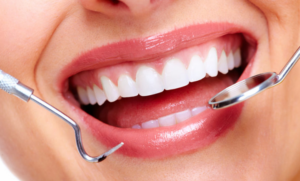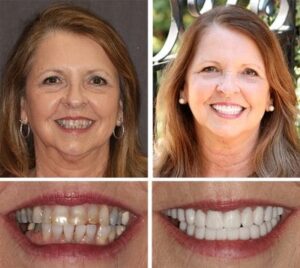
If you are researching the cost of full mouth reconstruction, it’s clear that you are considering a significant investment in your dental health. Rather than overwhelming you with vast price ranges or technical jargon, we aim to deliver a clear understanding of what factors contribute to the overall expense. From procedural details and material costs to insurance considerations, this article offers an extensive overview to help you estimate the potential investment needed for this transformative dental journey.
Key Takeaways
- The cost of full mouth reconstruction varies widely, from $30,000 to $150,000 in the US, influenced by the complexity of the necessary dental treatments, the chosen materials, and the geographic location of the dental practice.
- Dental insurance may cover a portion of full mouth reconstruction costs, generally from 50 to 80 percent up to the annual maximum, but it often excludes cosmetic treatments, and the coverage details vary across different insurance plans.
- Financing options are available for full mouth reconstruction, including medical credit cards with promotional offers, personal loans with various interest rates, and payment plans that can be tailored to individual financial situations.
Breaking Down the Full Mouth Reconstruction Cost
The total cost of full mouth reconstruction is shaped by various factors, which should be understood when considering the treatment. These include the nature and complexity of the required treatments, the materials chosen for use, and the geographic location of the dental practice. For instance, full mouth restoration encompasses a range of treatments including dental implants, which are priced between $3,000 to $5,000 per tooth, as well as other procedures targeting issues with teeth, gums, and bone structure.
Delving into the details, the total cost significantly depends on the number of teeth requiring restoration and the complexity of each case. In the US, the cost typically falls within the range of $30,000 to $100,000, varying based on the specific treatments needed. The selection of materials, particularly when choosing dental implants, also has a significant impact on the cost. For instance, the cost can be reduced by combining multiple implants with a bridge, thereby lowering the per-tooth cost. It is always advisable to check with your insurance provider to see if they cover any portion of the cost.
Understanding Treatment Expenses

- the extent of gum areas to be grafted
- the type of tissues utilized
- the performance of a jaw bone graft or sinus lift
- other associated procedures and materials
Once a stable foundation has been established, dental implants are often the following step in full mouth reconstruction. The cost of these procedures can be influenced by additional techniques such as bone grafting, which are utilized to enhance the foundation for these implants. The treatment plan will depend on the condition of the patient’s existing teeth and the desired outcome.
Furthermore, the costs of dental crowns and bridges can also add to the total cost, with dental crowns ranging from $500 to $3000 per tooth, and dental bridges ranging from $1,000 to $3,000 per tooth.
Material Choices and Their Impact on Cost
Choosing materials for reconstructing your smile is as important as selecting materials when building a house. The full mouth dental reconstruction cost can be influenced by your choice of materials, such as porcelain or composite resin. The average cost for porcelain inlays and onlays typically ranges from $250 to $1,500, while the cost of a zirconia crown can vary but generally falls on the higher end due to its durability and aesthetic qualities.
Material choices for full mouth rehabilitation extend beyond porcelain and zirconia. Full mouth rehabilitation can be carried out utilizing a range of materials including:
- All Acrylic
- Porcelain on top of metal alloys (PFM)
- Acrylic with Composite Teeth
- Porcelain crowns
- Captek Crowns
Each of these materials has its own advantages and disadvantages in terms of strength, aesthetics, and cost.
There are also alternative material options, such as dental bridges, for addressing a missing tooth, which can result in cost savings compared to individual crowns for each tooth. They also offer the benefit of easier cleaning due to the absence of gaps between teeth.
Geographic Influence on Pricing
It may be surprising to learn that the geographic location can significantly influence the cost of full mouth reconstruction. This means that the cost of the same procedure can vary significantly between different regions and countries. For instance, the cost of full mouth reconstruction can indeed be lower in Mexico compared to the US. This is because the cost of living in a specific region can influence dental procedure prices. Generally, areas with a higher cost of living tend to have higher dental fees.
Therefore, the cost of full mouth reconstruction varies across regions due to factors such as the specific procedures required, the materials utilized for restoration, and the geographical location.
Navigating Dental Insurance and Full Mouth Reconstruction
Planning for full mouth reconstruction can be daunting, especially when navigating the intricacies of dental insurance. However, understanding your insurance coverage can play a significant role in managing your overall expenses. The coverage for full mouth reconstruction under dental insurance varies depending on the type of insurance. Some plans may cover a portion of the cost, while others may not provide coverage for this procedure. On average, dental insurance generally covers approximately 50 to 80 percent of the cost for full mouth reconstruction procedures, up to the annual maximum. However, the actual coverage may differ based on the specifics of your dental insurance plan.
Insurance may cover some or all of the expenses linked to significant restorative procedures in full mouth reconstruction, depending on the specifics of the insurance plan and the medical necessity of the treatments. Therefore, it is beneficial to gain a comprehensive understanding of your insurance policy and collaborate with a dental office that possesses expertise in dealing with insurance providers. This can facilitate patients in maximizing the coverage offered by their insurance.
What Dental Insurance Plans Typically Cover
Dental insurance plans provide coverage for a variety of dental procedures. However, when it comes to full mouth reconstruction, the coverage can vary. Dental insurance plans may provide coverage for certain restorative procedures related to full mouth reconstruction, but may not cover cosmetic treatments, depending on the specifics of the plan.
Restorative dental procedures commonly covered by insurance encompass:
- Dentures
- Bridges
- Crowns
- Root canal treatment
- Tooth extractions
- Dental implants
On the other hand, cosmetic dental procedures, including:
- teeth whitening for natural teeth
- tooth shaping
- veneers
- gum contouring
are excluded from coverage by dental insurance as they are deemed non-essential and not directly linked to oral health maintenance.
Other examples of dental treatments that are generally classified as cosmetic and are not covered by insurance include:
- Teeth whitening
- Veneers
- Cosmetic bonding
- Orthodontic treatments performed for cosmetic purposes
When Insurance Falls Short
Although insurance can be a substantial financial aid, it’s important to keep in mind that it may not cover all expenses. For instance, PPO dental insurance typically covers approximately 50 percent of the cost of full mouth reconstruction. Hence, dental insurance plans frequently do not fully cover the entire cost of full mouth reconstruction, often only providing coverage for up to 50 percent of major restorative services, which is contingent upon the annual maximum. Therefore, it is essential to understand your insurance coverage fully and explore other options whenever necessary.
In cases where insurance coverage is insufficient, patients have the opportunity to consider various payment options. These may include obtaining a loan or arranging payment plans with their dentist. It is always advisable to thoroughly explore all available options before deciding on the best approach to financing your full mouth reconstruction.
Financing Your Path to a Healthier Smile

Medical credit cards are tailored for healthcare expenses and can provide promotional financing options, such as zero percent interest for a specified period, which can be advantageous for settling the balance before the promotional period concludes. Additionally, personal loans offer a lump sum that can be utilized for the complete treatment or a part of it. They are advantageous for financing full mouth reconstruction as they enable the opportunity to explore favorable interest rates and terms.
Exploring Payment Plans
Payment plans offer an effective way to manage the cost of full mouth reconstruction by spreading payments over time. They provide patients with the opportunity to finance their treatment over a period of time, often with minimal or no interest rates. Payment plans for full mouth reconstruction can be acquired through various means such as:
- Personal loans
- Borrowing from retirement savings
- Seeking financial aid
- Third-party finance companies like CareCredit, Lending Club and Proceed Finance also provide dental financing options.
Patients are advised to inquire with the dental practice regarding the availability of payment plans and to obtain information about the terms and conditions associated with them. The terms and conditions of payment plans for full mouth reconstruction are subject to variation based on the selected financing plan. Repayment timelines may differ, and certain plans provide interest-free monthly payment alternatives.
Finding the Right Financing Option
Finding the right financing option is a crucial step in your journey towards a healthier smile. Financing options for full mouth reconstruction encompass third-party financing options such as healthcare-specific credit lines or personal loans, payment plans, and medical credit cards. However, it’s important to consider both the benefits and potential drawbacks of each option. For instance, medical credit cards can offer convenience but may come with high interest rates and extra fees.
Dental loans, on the other hand, are a type of unsecured personal loans that do not necessitate collateral. The interest rates for these loans generally adhere to a fixed rate, typically ranging from 4% to 36% APR. These rates are influenced by factors such as creditworthiness. By exploring these options and assessing your personal financial situation, you can find the best solution to finance your full mouth reconstruction.
The Value Behind the Cost of Full Mouth Reconstruction

In addition to these immediate benefits, full mouth reconstruction provides life-changing advantages such as:
- Improved oral health
- Increased self-confidence
- Better overall well-being
- Potential prevention of future dental problems
Therefore, the cost of full mouth reconstruction is not just an expense, but a long-term investment in your smile and overall health.
Life-Changing Benefits
Quality of life can see a significant improvement with full mouth reconstruction, making it a potential game-changer. The advantages of full mouth reconstruction encompass enhanced oral health, regained functionality, and heightened self-assurance. Full mouth reconstruction contributes to improved oral health by effectively addressing a range of dental issues, including missing or damaged teeth, which can have a significant impact on the overall health of the mouth.
Moreover, full mouth reconstruction contributes to restoring functionality by rebuilding and/or replacing all of the teeth, which in turn allows for improved chewing, speaking, and overall dental function. Equally important is the impact on patient confidence. Full mouth reconstruction can enhance patient confidence by promoting a healthy and aesthetically pleasing smile, which in turn can lead to increased comfort in smiling without self-consciousness.
A Long-Term Investment in Your Smile
Despite the considerable upfront cost of full mouth reconstruction, it’s essential to perceive it as a long-term investment. Engaging in full mouth reconstruction can proactively mitigate future dental issues and result in long-term cost savings. Full mouth reconstruction offers enduring functional and aesthetic enhancements to your smile, resulting in reduced future dental treatment expenses.
Moreover, the typical duration of full mouth reconstructions is substantial, with dental implants having the potential to last a lifetime and complete dentures lasting around 12 years. This demonstrates a significant period during which additional dental expenses can be minimized, reflecting the long-term value of this investment. Therefore, the value of full mouth reconstruction extends beyond the immediate benefits and into the future, making it a wise investment for many patients.
Choosing the Right Dental Professional for Your Full Mouth Reconstruction
Selecting the right dental professional for full mouth reconstruction is critically important. While it might be tempting to opt for the cheapest option, it’s crucial to remember that this is a significant investment in your health and well-being. Therefore, it is advisable to seek out a well-regarded, top-rated dental practice that has the capability to fulfill your desired outcome.
In this endeavor, it is advisable for patients to conduct thorough research on individual dentists, rather than solely focusing on dental offices. This is because the success of your full mouth reconstruction is largely dependent on the expertise and skill of the dentist performing the procedures.
Evaluating Experience and Expertise
Considering the credentials of a dentist is vital when selecting one for full mouth reconstruction. A dentist undertaking full mouth reconstruction should possess:
- A professional dental degree such as Doctorate of Dental Surgery (DDS) or Doctor of Dental Medicine (DMD)
- Specialized training in areas like dental implantology
- Board certification in oral reconstruction
These credentials are crucial in ensuring that you choose a qualified dentist for your full mouth reconstruction.
Furthermore, the dentist’s proficiency in full mouth reconstruction can be demonstrated by their capability to manage complex cases, such as identifying worn-down teeth, addressing chronic pain, treating missing teeth, and effectively resolving various dental issues. Apart from credentials, it is crucial to consider a dentist’s training, overall years of experience, and the complexity of previous cases to ensure they have the requisite expertise for full mouth reconstruction.
Considering the Dental Office Environment
The environment of the dental office significantly influences your experience during the full mouth reconstruction journey. Factors such as:
- Location
- Competition
- Size
- The overall success of the practice
can have an impact on your experience.
Moreover, the cleanliness and maintenance of a dental office have a significant impact on the patient experience. A clean and well-maintained dental office fosters a positive perception and trust in the practice, ultimately resulting in:
- Higher patient satisfaction
- Increased patient loyalty
- Better word-of-mouth referrals
- Improved patient retention
Summary
In conclusion, full mouth reconstruction is a comprehensive solution to restore the health, functionality, and aesthetics of your teeth. While the cost can be significant, it’s important to view it as an investment in your oral health, functionality, and self-confidence. With the right dental professional, financing options, and understanding of your insurance coverage, you can navigate the cost of full mouth reconstruction and embark on your journey towards a healthier smile.
Frequently Asked Questions
What does a full mouth reconstruction consist of?
A full mouth reconstruction consists of treatments like crowns, bridges, veneers, dental implants, and dentures, which aim to improve both the appearance of the smile and the efficiency of chewing for the patient. Orthodontics may also be used in some cases to achieve the best outcome.
What are the disadvantages of full mouth rehabilitation?
Full mouth rehabilitation can lead to increased susceptibility to gum disease and tooth decay, especially if artificial teeth become loose, allowing bacteria to enter the gum line. Be mindful of these potential disadvantages.
How many implants are needed for full mouth?
A full mouth dental implant procedure may require 8 to 16 dental implants, with approximately four to eight implants needed for the upper and lower jaws each.
How much does it cost to restore a tooth?
Restoring a tooth can cost around $1500 for a dental crown and from $5,000 for a dental implant, depending on the specific factors involved. Consider discussing these options with your dentist to determine the best approach for your situation.
What factors influence the cost of full mouth reconstruction?
The cost of full mouth reconstruction is influenced by the nature of treatments, materials selected, and the location of the dental practice. These factors can significantly impact the overall expenses.


